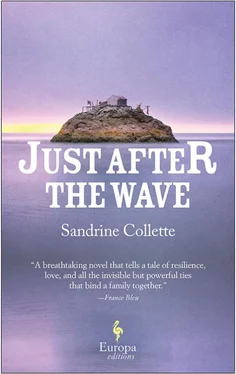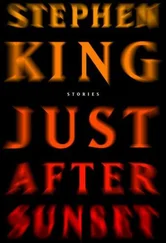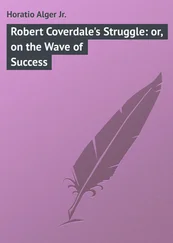With tears, naturally.
Noah is the first to fall to his knees. He calls to their mother. Perrine sits next to him, takes him in her arms. Louie joins them. All three cling to each other, their hands squeezed, white with the energy they put into silently promising not to leave one another. Three little creatures, their wet cheeks pressed together, sobbing words which the wind sweeps away.
They’re afraid.
They don’t know who will say it first: why have their parents abandoned them? Actually, they understood why when they read the letter that crumpled their faces and stopped their hearts—but there is something else they can’t stop thinking about, nor find the means to express: why them?
Why them and not the others.
Noah was the one who asked.
“I don’t know,” murmurs Louie to start with.
Perrine snivels, still looking out at the horizon as if she might miss seeing her parents on their boat, out there on the water. Her clear little voice, just the same. I don’t know.
“Because we were naughty?”
Silence. Maybe they are thinking. Noah continues.
“Because I’m too small, Louie has a sick leg, and Perrine’s only got one eye, is that why they left us? Because they didn’t love us?”
At the same time, they reply in one breath.
“No,” says Perrine.
“Yes,” says Louie.
* * *
That their parents didn’t love them; and if they knew, those little children left behind on the island, how their mother is sobbing in silence on the boat, just as they are crying alone on the damp earth, the mother who is holding Lotte and Marion tight, inconsolable. Emily and Sidonie are curled up next to Matteo. In the middle, Liam and his father are rowing. Because of the mounds of supplies, lashed in place with criss-crossing straps, they don’t have an inch to move, crowded fore and aft on their small craft. The father has installed ropes all around the gunwale, as a precaution.
Madie doesn’t know how the little ones will manage to sit still for twelve or fourteen days. We’ll stop , said Pata. But she silenced him with a look. No, they won’t stop. They will keep going until they reach higher ground and he will go back for the other three right away. He promised.
The night before their departure he was also the one who decided which children would stay behind on the hill. The mother didn’t want it, she was set on one impossible idea: take them all.
“We won’t last three days without supplies or water,” said the father. “We can’t be sure we’ll find any other people to help us. There might be nothing more until we reach the mountains. No people. No islands.”
Madie repeated, No more love. No more honor. We’re like animals. And she fell silent, because her gaze had met Pata’s, no need of words to pierce soul and flesh, is there, silence is enough, when it is so heavy with meaning, and it was the father who took a breath and started speaking after that silence; the harm was done. Nothing would ever erase the mother’s silence, nothing would ever prevent the words she had not uttered from going through Pata’s head over and over again, and every day he’d wonder if there was not some truth in them, and yet no, God, he swore that when, sick at heart, he had picked the names of the three little ones who’d stay behind, not once had it occurred to him, it was Madie who thought it must have, Madie who eventually came out with it, because it was too much to bear.
“The lame one, the half-blind one, the dwarf. So, we’ll leave them behind, the most damaged. We’ll finish what nature began.”
But the father saw things differently. He needed Liam and even Matteo to row, and they couldn’t abandon the little girls: they would never survive on the hill. Louie, Perrine, and Noah slept in the same room. It would be easier not to wake them when they left. Louie and Perrine were very resourceful. They would manage, they’ll surprise us, hey, don’t you think, implored the father. The mother wasn’t listening, she was blocking her ears. She didn’t want to hear his pathetic arguments. She simply murmured, “Suit yourself.”
“You’ll blame me.”
“I’ll blame you for everything, anyway.”
Because earlier that evening, when he had decided they must flee, she had tried. Oh, yes, she had tried to make him change his mind, and she’d hit him in the chest ten times, until he took her in his arms to stop her, until he murmured that they had no choice, and with all the spite she’d accumulated she snarled how unthinking he was, how stubborn, how criminally stupid, You see where it’s gotten you, your stubborn pride? You think I brought children into the world so that you can go and kill them?
The father had wept, too, but he’d held his ground. This time he was right, he was sure of it. He didn’t tell the mother but he felt they had to start by saving some of the children; deep inside, a little voice echoed, That’s already something. And when the mother swore she would stay on the hill to give her place on the boat to one more child, he refused point blank. She had to go with them. To watch over the children, to keep them calm. To look after them once they landed and the father went back for the others. He wouldn’t let her discuss it: she would be the mother of the six children on the boat.
But God, the other three!
“We could at least explain to them,” she begged.
But the children would scream and weep and cling to them when it came time to leave, thought the father. Neither one of them, neither he nor the mother, would have the courage to pry their little fingers from the ropes on the boat; neither one of them would be able to shove them away with the blades of the oars when they flung themselves into the water to follow them like little abandoned dogs about to drown. Their cries would stay with them all through the crossing: shrill at first, then more and more distant. No, it was unbearable.
The mother begged him to think about it.
“Can’t we find something to put them in—a tub, a feed trough. We could tow them behind the boat.”
The father shook his head: every solution was futile. There was nothing left on the hill. Nor any time left. The sea was still threatening, it would already be hard enough with one boat. So they gathered the necessary supplies, hiding them in a corner of the barn; they threw together a few belongings, blankets, tarps, when the children wouldn’t see them, most often in the middle of the night. Madie helped, weeping, sick with shame. Hiding from my own children , she sobbed. It’s as if I were preparing their coffin. Pata took her by the shoulders and shook her.
“Will you stop?”
He had repaired the boat without a word, as the children cried for joy. When he first launched it, Noah wanted to go with him to check that it was watertight, sliding his little hands over the repair, looking for any signs of a drop seeping through.
“Not a thing,” he concluded, delighted. “Pata, you’re great.”
And the father had given him an odd look, you’d think he wasn’t all that happy to have such a seaworthy boat after all. Noah went on smiling, calling to the others onshore, who called back, somewhat envious.
And so Madie and Pata left at dawn on the thirteenth day, rousing six of their nine children without a sound, piling their belongings wet with their mother’s tears there among them, while Liam and Matteo, whom the father had ordered to keep quiet, whispered together, wide-eyed.
“Where are Louie, Perrine, and Noah? Where are we going?”
* * *
But of course this is of no consolation to the children on the island. The only thing they can see is the deserted land around them.
Читать дальше












